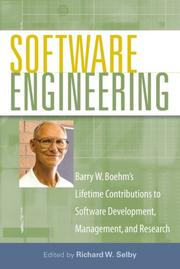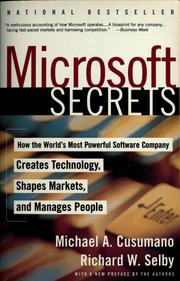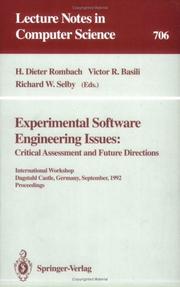| Listing 1 - 7 of 7 |
Sort by
|

ISBN: 047014873X Year: 2007 Publisher: Hoboken, New Jersey : [Piscataqay, New Jersey] : Wiley-Interscience, IEEE Xplore,
Abstract | Keywords | Export | Availability | Bookmark
 Loading...
Loading...Choose an application
- Reference Manager
- EndNote
- RefWorks (Direct export to RefWorks)
Landmark findings and best practices from software engineering pioneer Barry W. Boehm based on forty years of research and experienceThis book presents forty-two of Barry W. Boehm's best articles on software engineering, organizes them into nine chapters with newly written summaries by nine of his colleagues, and concludes with a new chapter on Barry's "thoughts for the future." The book chapters address:. Software Architecture and Quality. Software Economics. Software Tools. Software Process: Early Spiral Model. Software Risk Management. Software Process: Emerging Extensions. Software and Systems Management. Software Engineering State of the Art and Practice. Value-Based Software Engineering. A Software Engineer in the Software CenturyThis book is recommended as a guide and resource for software engineers, project managers, and technology executives as well as a textbook for advanced undergraduate and graduate courses."In my view, Barry Boehm is single-handedly responsible for turning software engineering from an anecdote-driven, opinion-laden art form into data-driven, fact-based engineering."-Dr. William A. Wulf, President, National Academy of Engineering"This book is a must-read for all software engineers."-Dr. Yannis C. Yortsos, Dean, Viterbi School of Engineering, University of Southern California"Barry Boehm has led the effort to put a sound footing under software engineering. His Software Engineering Economics provided fact-grounded models that first enabled us to move beyond speculation in budgeting and scheduling. His spiral development model and risk-management strategies each constitute major advances in our thinking."-Dr. Frederick P. Brooks, Jr., Kenan Professor of Computer Science, University of North Carolina"This book makes clear Barry Boehm's enormous contributions to software engineering over several decades and provides a perspective no one else could have given."-Dr. Victor R. Basili, Professor of Computer Science, University of Maryland"This collection of articles illuminates why Barry Boehm is one of the software industry's most trusted advisors."-Walker E. Royce, Vice President, IBM Rational"Barry Boehm has spent much of his adult life guiding us and our industry; I, for one, am full of gratitude."-Tom DeMarco, Principal, The Atlantic Systems Guild"Read Boehm's hints that will make your software shop tick."-Dr. Lawrence Bernstein, Professor of Software Engineering, Stevens Institute of Technology"Barry Boehm's insights into software engineering are one of a kind. For more than twenty-five years, Barry has been the leading figure in software cost models and software process. This book is a must-read for all software engineers."-Dr. Arthur B. Pyster, Vice President, SAIC"Barry Boehm stands as a model engineering researcher for having developed novel theories, methods, and tools that infuse economic and human values into software engineering. This book provides a valuable starting point and guide to researchers and practitioners alike who need to better understand state-of-the-art thinking in this area."-Dr. Kevin J. Sullivan, Professor of Computer Science, University of Virginia"Anyone who wishes to understand where software engineering has been, and is going, needs to read this collection of articles. They represent the perspectives of the man who has made so much of this happen in decades past, and whose work will undoubtedly provide direction to the community for decades to come."-Dr. Leon J. Osterweil, Professor of Computer Science, University of Massachusetts.

ISBN: 0028740483 Year: 1995 Publisher: New York (N.Y.): Free Press
Abstract | Keywords | Export | Availability | Bookmark
 Loading...
Loading...Choose an application
- Reference Manager
- EndNote
- RefWorks (Direct export to RefWorks)
Computer software industry --- Microsoft Corporation. --- Microsoft --- Programming

ISBN: 9780470187562 0470187565 9780470148730 Year: 2007 Publisher: Hoboken, New Jersey [Piscataqay, New Jersey] Wiley-Interscience IEEE Xplore
Abstract | Keywords | Export | Availability | Bookmark
 Loading...
Loading...Choose an application
- Reference Manager
- EndNote
- RefWorks (Direct export to RefWorks)
Landmark findings and best practices from software engineering pioneer Barry W. Boehm based on forty years of research and experienceThis book presents forty-two of Barry W. Boehm's best articles on software engineering, organizes them into nine chapters with newly written summaries by nine of his colleagues, and concludes with a new chapter on Barry's "thoughts for the future." The book chapters address:. Software Architecture and Quality. Software Economics. Software Tools. Software Process: Early Spiral Model. Software Risk Management. Software Process: Emerging Extensions. Software and Systems Management. Software Engineering State of the Art and Practice. Value-Based Software Engineering. A Software Engineer in the Software CenturyThis book is recommended as a guide and resource for software engineers, project managers, and technology executives as well as a textbook for advanced undergraduate and graduate courses."In my view, Barry Boehm is single-handedly responsible for turning software engineering from an anecdote-driven, opinion-laden art form into data-driven, fact-based engineering."-Dr. William A. Wulf, President, National Academy of Engineering"This book is a must-read for all software engineers."-Dr. Yannis C. Yortsos, Dean, Viterbi School of Engineering, University of Southern California"Barry Boehm has led the effort to put a sound footing under software engineering. His Software Engineering Economics provided fact-grounded models that first enabled us to move beyond speculation in budgeting and scheduling. His spiral development model and risk-management strategies each constitute major advances in our thinking."-Dr. Frederick P. Brooks, Jr., Kenan Professor of Computer Science, University of North Carolina"This book makes clear Barry Boehm's enormous contributions to software engineering over several decades and provides a perspective no one else could have given."-Dr. Victor R. Basili, Professor of Computer Science, University of Maryland"This collection of articles illuminates why Barry Boehm is one of the software industry's most trusted advisors."-Walker E. Royce, Vice President, IBM Rational"Barry Boehm has spent much of his adult life guiding us and our industry; I, for one, am full of gratitude."-Tom DeMarco, Principal, The Atlantic Systems Guild"Read Boehm's hints that will make your software shop tick."-Dr. Lawrence Bernstein, Professor of Software Engineering, Stevens Institute of Technology"Barry Boehm's insights into software engineering are one of a kind. For more than twenty-five years, Barry has been the leading figure in software cost models and software process. This book is a must-read for all software engineers."-Dr. Arthur B. Pyster, Vice President, SAIC"Barry Boehm stands as a model engineering researcher for having developed novel theories, methods, and tools that infuse economic and human values into software engineering. This book provides a valuable starting point and guide to researchers and practitioners alike who need to better understand state-of-the-art thinking in this area."-Dr. Kevin J. Sullivan, Professor of Computer Science, University of Virginia"Anyone who wishes to understand where software engineering has been, and is going, needs to read this collection of articles. They represent the perspectives of the man who has made so much of this happen in decades past, and whose work will undoubtedly provide direction to the community for decades to come."-Dr. Leon J. Osterweil, Professor of Computer Science, University of Massachusetts.

ISBN: 3540570926 Year: 1993 Publisher: Berlin ; Heidelberg ; New York Springer
Abstract | Keywords | Export | Availability | Bookmark
 Loading...
Loading...Choose an application
- Reference Manager
- EndNote
- RefWorks (Direct export to RefWorks)

ISBN: 0387570926 Year: 1993 Publisher: Berlin : Springer-Verlag,
Abstract | Keywords | Export | Availability | Bookmark
 Loading...
Loading...Choose an application
- Reference Manager
- EndNote
- RefWorks (Direct export to RefWorks)
Digital

ISBN: 9783540713012 Year: 2007 Publisher: Berlin, Heidelberg Springer-Verlag Berlin Heidelberg
Abstract | Keywords | Export | Availability | Bookmark
 Loading...
Loading...Choose an application
- Reference Manager
- EndNote
- RefWorks (Direct export to RefWorks)
Book

ISBN: 9783540713012 Year: 2007 Publisher: Berlin, Heidelberg Springer-Verlag Berlin Heidelberg
Abstract | Keywords | Export | Availability | Bookmark
 Loading...
Loading...Choose an application
- Reference Manager
- EndNote
- RefWorks (Direct export to RefWorks)
Victor R. Basili, Dieter Rombach, and Kurt Schneider Introduction In 1992, a Dagstuhl seminar was held on Experimental Software Engineering Issues (seminar no. 9238). Its goal was to discuss the state of the art of empirical software engineering (ESE) by assessing past accomplishments, raising open questions, and proposing a future research agenda. Since 1992, the topic of ESE has been adopted more widely by academia as an interesting and promising research topic, and in industrial practice as a necessary infrastructure technology for goal-oriented, sustained process improvement. At the same time, the spectrum of methods applied in ESE has broadened. For example, in 1992, the empirical methods applied in software engineering were basically restricted to quantitative studies (mostly controlled experiments), whereas since then, a range of qualitative methods have been introduced, from observational to ethnographical studies. Thus, the field can be said to have moved from experimental to empirical software engineering. We believe that it is now time to again bring together practitioners and researchers to identify both the progress made since 1992 and the most important challenges for the next five to ten years.
| Listing 1 - 7 of 7 |
Sort by
|

 Search
Search Feedback
Feedback About UniCat
About UniCat  Help
Help News
News